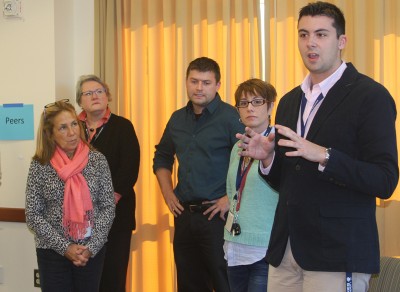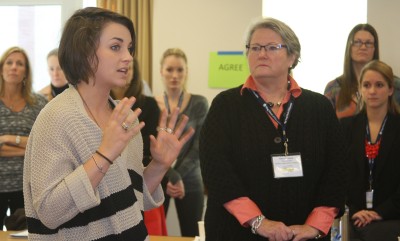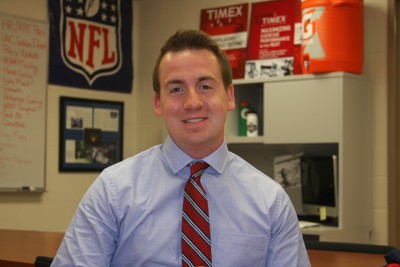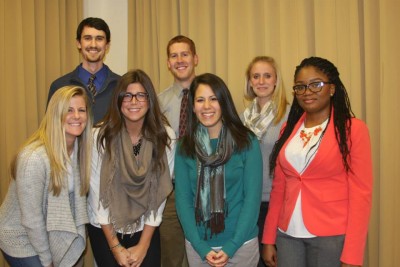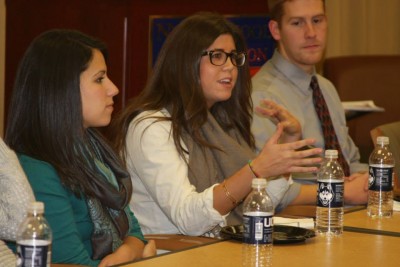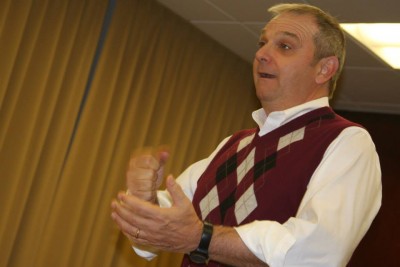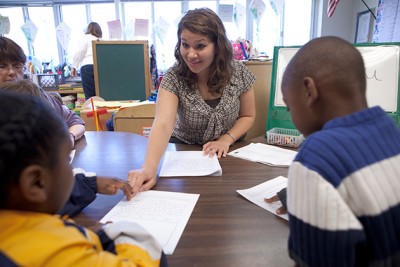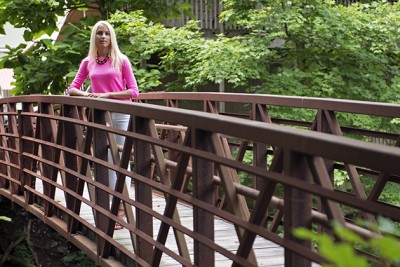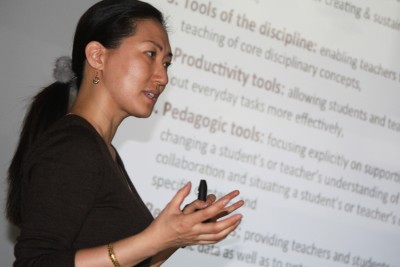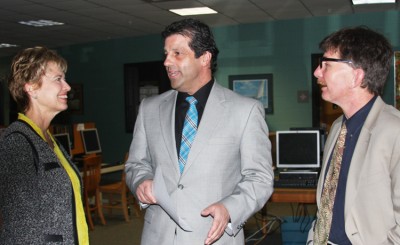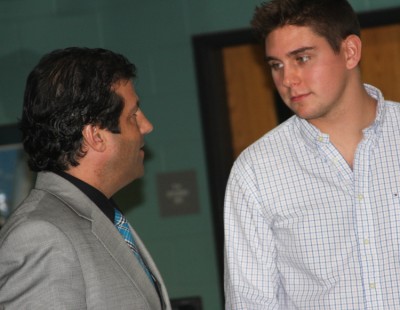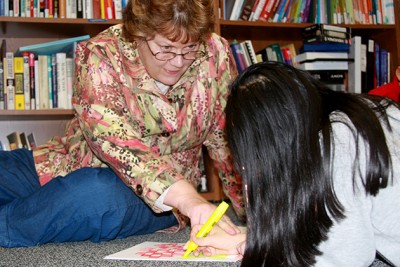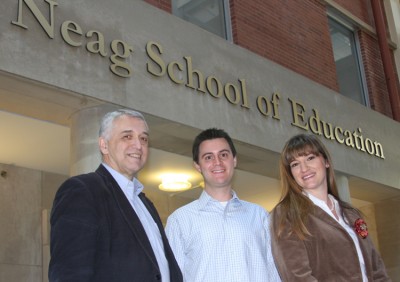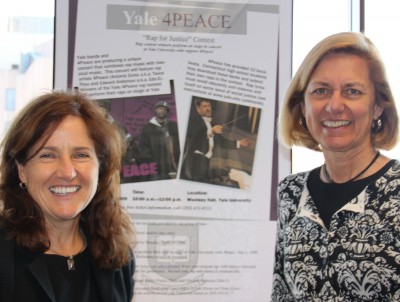 Accolades – below are news and notes from our alumni, faculty, staff, and students. We are proud of all the amazing accomplishments by our Neag family. If you have an accolade to share, we want to hear from you! Please send any news items (and story ideas) to shawn.kornegay@uconn.edu.
Accolades – below are news and notes from our alumni, faculty, staff, and students. We are proud of all the amazing accomplishments by our Neag family. If you have an accolade to share, we want to hear from you! Please send any news items (and story ideas) to shawn.kornegay@uconn.edu.
Students
Five of our current IB/M Honors juniors have received SHARE grants with faculty members for the spring semester – representing 25% of all the SHARE grants awarded for this year. They include: Daniel Arndt, Educational Leadership, Evaluation of Gifted Education Using State Accountability Systems; Rachael Cerutti, Elementary Education, Evaluation of Gifted Education Using State Accountability Systems; Jennifer Moore, Secondary Education, Gifted Students Achievement Patterns Beyond High School; Bailey Muchin, Special Education, Discourse in Linguistically Diverse Mathematics Classrooms; and Melissa Scarbrough, Secondary Education/French, Examining Questioning in Reading Classrooms.
Joshua Wilson is being recognized by the Council for Exceptional Children (CEC) with the Division for Research Student Award for his paper “Does Automated Feedback Improve Writing Quality.” He will be recognized at CEC’s annual convention in Philadelphia in April.
Alumni
First-year teachers came back to visit fifth-year teacher education students in order to provide insight and answer questions. The students included Arianna Aquilinoa, Meloney Bailey, Shannon Bostiga, Marissa Boucher James Dinnan, Jeffrey Russell and Kelly Soule. Richard Schwab and Michele Femc-Bagwell organized the visit.
The Neag Alumni Society recently elected the following new individuals to the board: Katy Lenehan, Sarah Mische, Kaitlin Roig and Kim Ruiz. New officers include: Lou Ando, president; Desi Nesmith, vice president; Megan Baker, treasurer; and Kate Heintz Lund, secretary.
Carly Buehler, BS ’11, MA ’12, visited the Neag School, along with Gertrude Banda, the principal of Chikumbuso, a community school in Zambia, to talk about their experiences. The presentation was how two people — and Chikumbuso, a local project — are making a difference for orphans, women, and at risk youth. They provided insight to current IB/M students how the students’ professional training could help serve others beyond our borders as well as in U.S. schools. While a high school student, Buehler first volunteered for the school doing her senior project on “The Stigma of AIDS” and spent two weeks doing fieldwork within the classrooms. She continued her involvement while a Neag student through doing two independent studies about the school. After graduation, she moved to Zambia and is currently volunteering doing teacher training and curriculum development at the school.
Jennifer (Elman) Cushman, BS ’07 in animal science, MA ’08 in curriculum and instruction, ’12 sixth year, head agriscience teacher at Glastonbury High School’s Regional Agriscience and Technology Center, was recently given an “outstanding young member” award by the National Association of Agricultural Educators. It is one of six handed out nationwide by the 8,000-member professional group for agricultural educators. The West Hartford native has been a teacher at Glastonbury since 2008, her first job in the field.
Kathryn Desrosiers, ’01, was named Bolton Public School’s Teacher of the Year. She serves as the music coordinator for the district while teaching high school concert band, 7-8th grade concert band, advanced placement music theory, and music technology. A flute player, Desrosiers earned a B.S. in education and a B.A. in music.
Timothy Dowding, Ph.D. ’88 in educational technology, who teaches at UConn’s Stamford Campus, received a 2013 Provost’s Award for Excellence in Public Engagement for his project, which consists of converting wastes like seaweed into liquid fertilizer and coconut fiber into particleboard, as well as implementing the processes into countries where these natural resources and emerging markets exist, such as Haiti.
Donna Johnson, MA ’83 in educational psychology, was one of six poets selected by the Carnegie Mellon University Press Poetry Series to publish a collection of her poems titled Selvage.
Nancy Mattoon Kline, Ph.D. ‘94, received one of five Excellence Awards for leadership, innovation, and service to the Library and Information Sciences profession. The award was presented at the URI Graduate School of Library and Information Studies “50th Anniversary Gala” in Warwick, RI. She earned her master of library science degree from URI and is a retired academic librarian.
Lynn Segal Mark, MA ’74, recently received the 2013 Tomko Award for Outstanding Achievement from Southwest Ohio Rehabilitation Association. This is a lifetime achievement award presented to an individual or organization whose lifetime achievement represents a major contribution to the rehabilitation of people with disabilities. She was a senior vocational rehabilitation counselor for the State of Connecticut from 1975-83 and later became a senior vocational rehabilitation counselor in the State of Ohio.
Mary Jo (Cervoni) Myslinski passed away at the age of 63. She retired as a principal from Center Road School. She earned a master’s degree and sixth-year in educational leadership from the Neag School.
Stamford’s Denis and Britta Nayden, alumni and long-standing donors to the UConn, have donated $3 million toward the new UConn Basketball Champions Center and for scholarships for student athletes. A key feature of the gift is a challenge match to all former UConn Husky basketball players who contribute to the new practice center. The Nayden gift has three parts: $1 million for the UConn Basketball Champions Center currently under construction on the Storrs campus, $1 million in scholarships for student-athletes and trainers enrolled in the School of Business or the physical therapy or kinesiology programs of the Neag School of Education, and a challenge match of up to $1 million for gifts from former UConn Husky basketball players.
Sally Neal, MA ’01 in higher education student administration, Ph.D. ’09 in adult learning is director of the Academic Advising Center at Ithaca College in Ithaca, N.Y.
Steve Nelson, Ph.D. ’96 in higher education, has published his fifth book, College Presidents Reflect: Life In and Out of the Ivory Tower.
Janet Robinson, Ph.D. ‘06, was named the Connecticut Association of Public School Superintendents (CAPSS) Superintendent of the Year. Prior to joining Stratford Public Schools as superintendent in June 2013, Dr. Robinson served five years as superintendent of Newtown Public Schools and three years as superintendent of Derby Schools. She is also a recipient of the 2013 Neag School of Education Alumni Society’s Outstanding Superintendent Award.
Kaitlin Roig, BS ’05, MA ’06, who was the teacher who hid her class keeping them safe from the tragic events in Sandy Hook in December 2012, was given the Woman of Worth Award sponsored by L’Oréal Paris for her “Classes 4 Classes” project. As a result, she received $10,000 to use in support of her project. In addition, she is now one of ten women nominated to receive an additional $25,000 for her charity. Roig was recently invited to serve on the Neag School of Education Alumni Society board.
Kristen Shanley, BS ’99, MA ’00, was named Cheshire Teacher of the Year. She’s been a seventh-grade language arts teacher at Dodd Middle School for the past 13 years, since graduating from UConn.
Lois Greene Stone ’55 (ED), author and poet, has personal items in 49 different museums and historical societies, including The Smithsonian Institution. Married since 1956 to Dr. Gerald E. Stone, she witnessed her physician husband place the Doctor of Medicine hood over a grandson’s shoulders. Two of her 15 grandchildren are married.
Zato Kadambaya, MA ’04, is the math/science department head and STEM administrator at New London High School. He also has a MS in electrical engineering from UConn.
Faculty
Center for Policy Analysis (Morgaen Dondaldson and Casey Cobb) submitted a report on the pilot for the state’s new teacher evaluation system finds that it provides more guidance for teachers, but raises questions about whether educators have enough time to carry out the demanding assessments. The new evaluation system, which started in 14 districts last year and expanded statewide in September, ties a teacher’s performance rating to student achievement, including students’ test scores, as well as a variety of other factors, such as classroom observations by administrators.
EDCI hosted a Human Diversity, Rights and Disparities public forum on Nov. 7.
EKIN hosted a seminar on the “Underlying Mechanisms of Blood Pressure Responses to Acute Aerobic, Resistance, and Concurrent Exercise” featuring visiting professor Paulo Farinatti from Rio de Janeiro State University.
DPT students hosted the Class of 2014 Research Presentations and Alumni Lecture, featuring student and faculty presentations.
Husky Sport was recognized by the Community Renewal Team (CRT) with one of CRT’s partner awards at their 50th Annual Meeting for Husky Sport’s work in the Clark Street neighborhood.
Keith Barker recently presented a poster session at the 2013 New England Faculty Development Consortium‘s conference, along with one of his Graduate Certificate in College Instruction students, Matt Girgenti. Barker has offered EDCI courses since 1998 to prepare university graduates for future faculty positions. Well over 500 graduates from across all disciplines and campuses have now taken all or some of these courses.
Sandy Bell presented Extending Extension: Adult learning theory and practice applications in Cooperative Extension at the American Association for Adult and Continuing Education 62nd Annual Conference in Lexington, KY.
Mary Beth Bruder, director of the UConn A.J. Pappanikou Center for Excellence in Developmental Disabilities Research, Education and Service co-chaired the statewide committee that spent four years developing the “Connecticut Guidelines for a Clinical Diagnosis of Autism Spectrum Disorder.” Also involved was Laura Kern, a third-year Educational Psychology doctoral student at the Neag School, is both the mother of a 9-year-old son with autism and one of the parents involved in providing the data and insights needed to craft the new guidelines.
Jennie Bruening was part of the grant development team that was awarded $225K for the International Sports Programming Initiative exchange grant with UConn’s Global Training and Development Institute (GTDI). Husky Sport has a similar grant active right now with Hong Kong Baptist University. She also co-authored “Early adolescent male development: A study of a sport-based after-school program in an urban environment” in Research Quarterly in Exercise and Sport.
Laura Burton (fall 2013) is serving as a UConn Large Faculty Social Science Grant reviewer. She was also selected as an associate editor for the Journal of Intercollegiate Sport.
Sandy Chafoulous, along with CBER colleagues, came out with the Final Performance Report of “Project PBER: Postdoctoral Fellowship in Behavioral Education and Research” funded by the U.S. Department of Education. The report included information on four postdoctoral fellows, who are now faculty members at various universities across the US. They include Nick Gage, assistant professor of special education at the University of Florida; Dan Maggin, assistant professor of special education at the University of Illinois; Sabina Neugebauer, assistant professor of reading at Loyola University Chicago; and Breda O’Keeffe assistant professor of special education at the University of Utah.
Casey Cobb facilitated a panel at the 2013 Education Policy Symposium on State and Local Policy Implications of Mastery-Based Credit and Mastery-Based Diploma, Legislative Office Building, Hartford. He is giving a keynote next week at the symposium on “Magnets in a School Choice Arena: Innovation in Learning – What We Know” at Goodwin College. He also presented “Mentoring session for assistant professors seeking tenure and promotion” at the Annual Meeting of the University Council for Educational Administration in Indianapolis, IN. He has been invited to serve on the editorial board of the American Educational Research Journal (AERJ), Social and Institutional Analysis for 2014-15. He co-authored Fundamentals of statistical reasoning in education (4th Edition). HE also facilitated a panel session on Accountability and Assessment with the “State and Local Policy Implications of Mastery-Based Credit and Mastery-Based Diploma” at the Legislative Office Building.
Morgaen Donaldson, Casey Cobb and Kimberly LeChasseur co-authored “New roles for teachers unions? Reform unionism in school decentralization” in the Journal of Educational Change. They also co-authored “Negotiating site-based management and expanded teacher decision making: A case study of six urban schools” in Educational Administration Quarterly.
Morgaen Donaldson and Casey Cobb were co-presenters for a webinar on educator evaluation implementation with the Northeast Educator Effectiveness Research Alliance (NEERA). Morgan was also recognized with the 2013 University Council for Educational Administration’s Jack Culbertson Outstanding Junior Scholar Award (national award for research).
Wendy Glenn is the recipient of the 2013 Richard A. Meade Award for Research in English Education for her study, “Developing Under-standings of Race: Preservice Teachers’ Counter-Narrative (Re)Constructions of People of Color in Young Adult Literature,” in this year’s English Education. This award recognizes published research that investigates English/language arts teacher development at any educational level, of any scope and in any setting. The award was established in 1988 in honor of the late Richard Meade of the University of Virginia for his contributions to research in the teaching of composition and in teacher preparation.
Preston Green has co-authored “Having it Both Ways: How Charter Schools Try to Obtain Funding of Public Schools and the Autonomy of Private Schools” which will be published in the Emory Law Review. He also co-authored “Fighting ‘demographic destiny’: A legal analysis of the strategies that white enclaves might use to maintain school segregation” in George Mason University Civil Rights Law Journal. He was also a panelist on “Race and Education Today” at the “Brown v. Brown at 60: Looking Back, Looking Forward” symposium at the Washburn School of Law. In addition, The Greater Hartford Legal Aid (GHLA) Board recently elected him as its newest member.
William Kraemer was recognized at the “top expert in the US in the field of resistance training research” by Expertscape.
Catherine Little is on the Board of Directors of the National Association for Gifted Children.
Stephanie Mazerolle was honored with the Eastern Athletic Trainer’s Association (EATA) Research Grant in 2013. She will be recognized at EATA’s annual meeting in January.
Betsy McCoach, Kathy Gavin (recently retired from UConn), and Jill Adelson (former UConn doctoral student and now assistant professor at the University of Louisville) won the 2013 Gifted Child Quarterly Research Paper of the Year for “Examining the Effects of Gifted Programming in Mathematics and Reading Using the ECLS-K.”
Natalie Olinghouse is a featured panelist on “Redesigning Elementary Preparation Programs” at the upcoming AACTE Annual Meeting.
Jonathan Plucker and Frank Worrel (UC Berkley) won the National Association for Gifted Children 2013 Distinguished Scholar Award. Of the 200 ranked education scholars, he was ranked #94 by the American Enterprise Institute’s (AEI’s) on the “2014 Edu-Scholar Public Influence Rankings.”
Lisa Sanetti co-edited an American Psychological Association (APA) book Treatment Integrity: A Foundation for Evidence-Based Practice in Applied Psychology.
Del Siegle and Sally Reis were members of the closing conference keynote panel of past presidents of the National Association for Gifted Children that reflected on the past, present and future of gifted education. Siegle’s book “The Underachieving Gifted Child” received a glowing review from Teachers College Record.
George Sugai and Michael Coyne were panelists at the Education Forum, held at Housatonic Community College. The forum brought together education experts to discuss positive school climate and maximizing educational outcomes for youth.
Suzanne Wilson was elected as a new member to the National Academy of Education (NAE). The current members of this prestigious organization are the preeminent research scholars in the field of education. This recognition is a testament to Suzanne’s reputation, as an international scholar in education, as well as recognition of a lifetime of scholarly work that has had a significant impact in the field. She was also commissioned by NAE to write a paper on the “Recent Developments in STEM Education Relevant to the Qualities of Teacher Preparation Programs.”
Mary Yakimowski is the historian for the American Educational Research Association’s Division H. The organization itself is going to celebrate its 100th birthday. Currently, she is surveying members and then will be creating a video. Most people do not realize AERA has its roots in Division H; and it was started by 16 superintendents in school districts.
